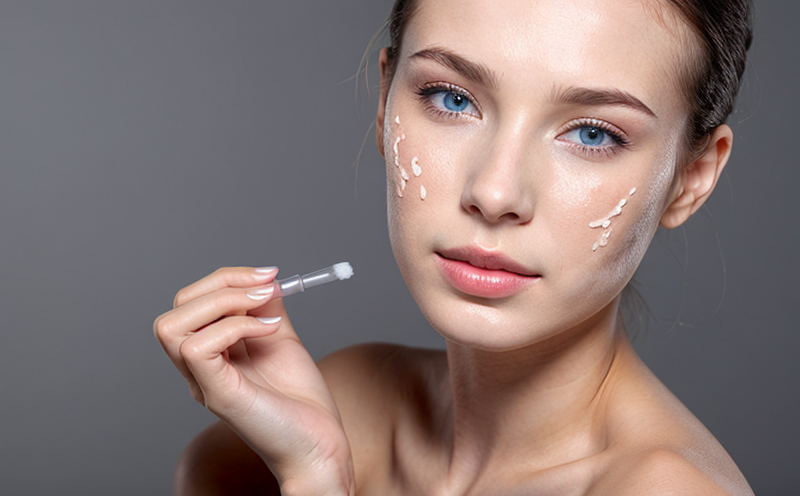Sensitization Testing in Cosmetic Lotions and Serums
In the realm of cosmetics testing, sensitization testing plays a pivotal role in ensuring that products are safe for consumers. This service focuses specifically on assessing the potential allergenic effects of cosmetic lotions and serums. These tests are crucial to safeguard against adverse reactions such as contact dermatitis and other forms of hypersensitivity.
Sensitization refers to an immune response where the body develops a reaction upon subsequent exposure to a previously harmless substance. In cosmetics, this can be particularly dangerous as consumers may unknowingly use products that contain ingredients capable of causing sensitization. Therefore, rigorous testing is imperative to identify and eliminate such risks before product release.
The process typically involves exposing test subjects to potential allergens for an extended period under controlled conditions. This allows the body’s immune system to develop a memory response against these substances. Subsequent re-exposure then triggers an allergic reaction if the substance has become sensitizing. The aim is to establish a threshold concentration above which sensitization can occur, ensuring that cosmetic formulations are safe and do not exceed this level.
In practice, this testing involves several steps:
- Identification of potential allergens through literature review and regulatory guidance;
- Preparation of test samples using standardized protocols;
- Application to test subjects according to established methods;
- Monitoring for signs of sensitization over a defined period.
The results provide critical insights into the safety profile of cosmetic ingredients, helping manufacturers make informed decisions about ingredient selection and formulation adjustments. By adhering strictly to international standards like ISO 10993-11, companies can ensure their products meet stringent regulatory requirements without compromising efficacy or consumer satisfaction.
Understanding the science behind sensitization testing is essential for quality managers, compliance officers, R&D engineers, and procurement teams involved in cosmetic product development. These professionals must stay abreast of evolving standards and practices to maintain competitive edges while prioritizing public health and safety.
Applied Standards
Sensitization testing in cosmetics is governed by several international standards designed to ensure consistent and reliable assessment methods. The key standard here is ISO 10993-11, which provides comprehensive guidelines for the biological evaluation of medical devices, including those used in cosmetics. This includes assessing the potential for allergenicity through sensitization testing.
ISO 10993-11 outlines specific procedures to identify and evaluate contact allergens present in cosmetic products. It also specifies the conditions under which tests should be conducted, such as the duration of exposure and the number of test subjects required. Compliance with these standards is mandatory for manufacturers aiming to secure market access in Europe and other regions adhering to EU regulations.
Other relevant standards include:
- ASTM F854: Standard Practice for Determining Allergic Contact Dermatitis from Cosmetic Products
- EN 13726: Cosmetics - Preparation of Test Substances, Application and Evaluation Procedures for Skin Irritation Tests on Human Volunteers
- IEC TR 62709-4: Medical Devices - Biological evaluation of medical devices - Part 4: Allergenicity Assessment
These standards collectively provide a robust framework for conducting sensitization tests, ensuring that the results are valid and reproducible. Adherence to these guidelines not only helps in meeting regulatory requirements but also enhances product safety and consumer trust.
Eurolab Advantages
At Eurolab, our commitment to excellence ensures that we deliver the highest quality of sensitization testing services. With a team of highly experienced professionals and state-of-the-art facilities equipped with advanced analytical instruments, we provide accurate, reliable results consistently.
Our comprehensive approach integrates both traditional methodologies and cutting-edge technologies to stay ahead in the ever-evolving landscape of cosmetic safety assessments. By leveraging international standards such as ISO 10993-11, we ensure that every test conducted meets the highest industry benchmarks. Our robust quality assurance processes further guarantee precision and accuracy throughout all stages of testing.
Furthermore, Eurolab’s expertise spans various sectors including pharmaceuticals, medical devices, and consumer products beyond cosmetics. This broad experience allows us to offer tailored solutions addressing unique challenges faced by different industries within the broader healthcare ecosystem.
Frequently Asked Questions
- Enhances product safety by identifying allergens early;
- Maintains compliance with regulatory requirements globally;
- Supports informed decision-making during formulation development;
- Aids in meeting consumer expectations for safe and effective products.





